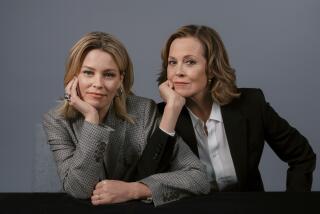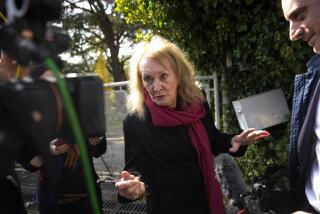Elizabeth Janeway, 91; Novelist Turned to Nonfiction and Feminism in 1970s
- Share via
Elizabeth Janeway, an author who began her career writing popular novels in the 1940s but turned to nonfiction in the 1970s to express her strong support of the women’s movement, has died. She was 91.
She had been in declining health and died Saturday in a retirement home in Rye, N.Y., her son, Michael Janeway, told The Times on Thursday.
Janeway attracted national attention as a feminist author with her 1971 book, “Man’s World, Woman’s Place: A Study of Social Mythology.” She wrote five others on related topics, including “Between Myth and Morning: Women Awakening” (1974) and “Powers of the Weak” (1980). Critics praised her extensive historical research and practical advice.
For some years she also was a prolific reviewer for the New York Times, Ms. magazine and other publications, and often championed controversial works for their artistic merit or social relevance. She praised Vladimir Nabokov’s “Lolita” (1958) and Erica Jong’s “Fear of Flying” (1973), for example.
It was her first review of feminist literature that changed the course of Janeway’s career. Soon after writing it, she began researching her own book on the subject. “It became a five-year exercise in raising my consciousness,” she once said.
Earlier in her career, Janeway was known for novels that brought psychological insight to characters. Her first, “The Walsh Girls” in 1943, was about two sisters reunited after the husband of one was sent to a Nazi concentration camp. It became a bestseller.
“Daisy Kenyon” in 1945 was about a single woman having an affair with a married man. Joan Crawford starred in the movie version.
With seven successful novels to her credit, Janeway gave up fiction writing in the mid-’60s. “I was trying to understand the social change of the 1960s, and it was just too big for me to handle in a novel,” she said in a 1974 interview with the Los Angeles Times.
Among feminists, Janeway was a less-strident but still powerful voice.
“She was kind and supportive. She had great enthusiasm. But she was not a radical feminist,” author Vivian Gornick said in an interview Wednesday. “She did not have it in her to think radically.”
Other women stormed men’s clubs and men-only boardrooms. Janeway took a different tack. “She was a conservative woman of another age,” Gornick said. “She was wonderfully responsive on the bricks-and-mortar level. She wanted equal pay for equal work. She wrote at that level.”
Throughout her career, Janeway was as supportive of talented authors as she was of women’s rights. She was a judge for the National Book Awards in 1955 and the Pulitzer Prize in 1971, president of the Authors Guild for four years and an executive with PEN, the international organization for writers, starting in 1965.
“She was very active against any sort of censorship of writers,” Michael Janeway said. “As a writer herself, she believed in standing up for other writers.”
Born Jane Hall in Brooklyn, the daughter of a Navy architect and a homemaker, she graduated from Barnard College in New York City in 1935 and received the school’s distinguished alumna award in 1979.
She married Eliot Janeway, a noted economist and author, in 1938. They had two sons. Michael is a writer and editor and a faculty member of the Columbia Graduate School of Journalism in New York City. William is vice chairman of Warburg Pincus, a private equity firm.
After 40 years of marriage, Janeway said, her husband was as much a feminist as she was.
“I should say once and for all that my husband has been the greatest force in my life,” Janeway said in a 1979 interview with the New York Times. “I’ve been told and I’ve read that some women with careers have husbands who are made uneasy and jealous by a wife’s success. My husband would regard any failure to do my best at all times as unworthy.”
Janeway, whose husband died in 1993, is survived by her sons as well as three grandchildren and a great-grandchild.
More to Read
Sign up for our Book Club newsletter
Get the latest news, events and more from the Los Angeles Times Book Club, and help us get L.A. reading and talking.
You may occasionally receive promotional content from the Los Angeles Times.










